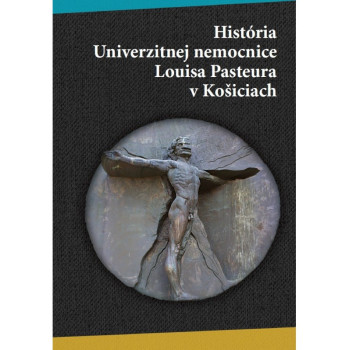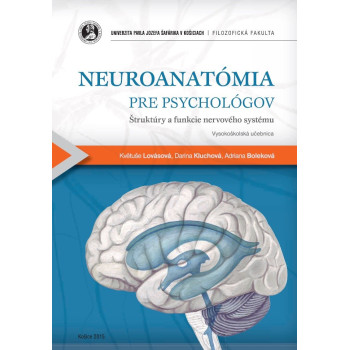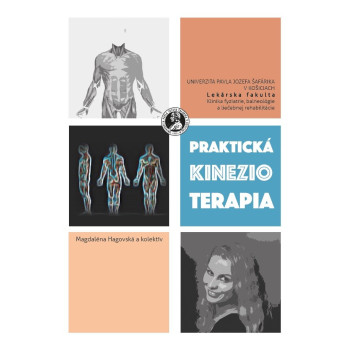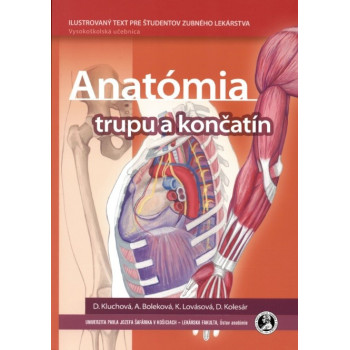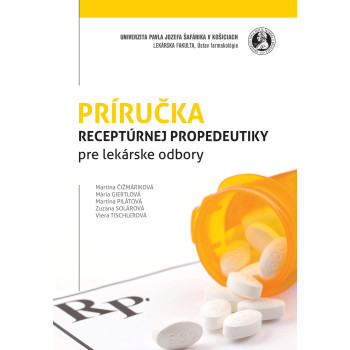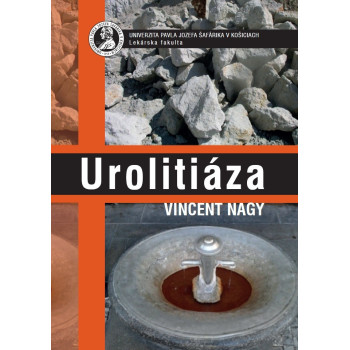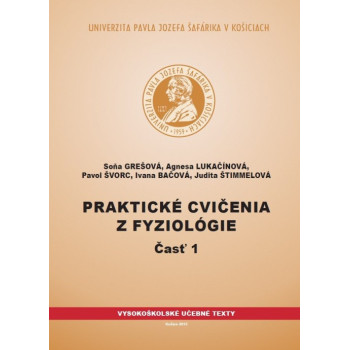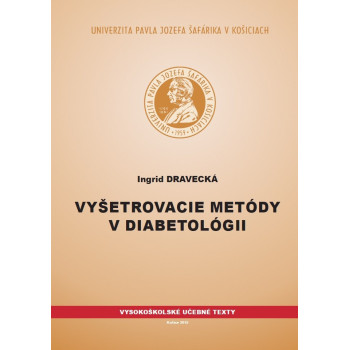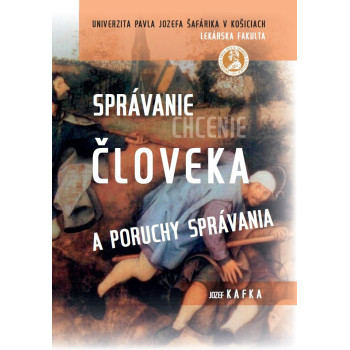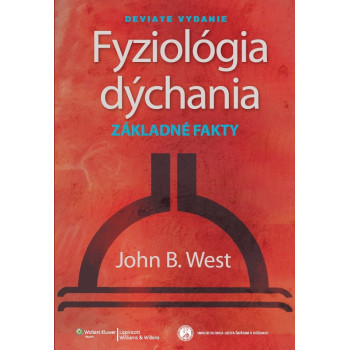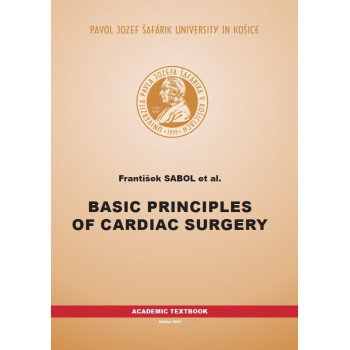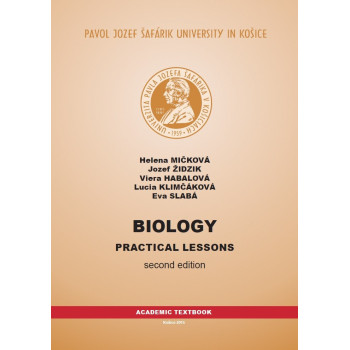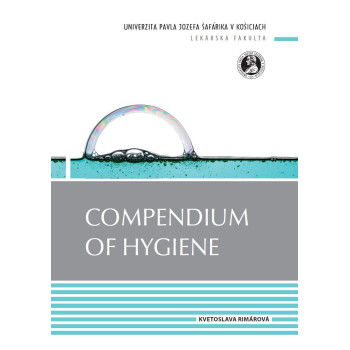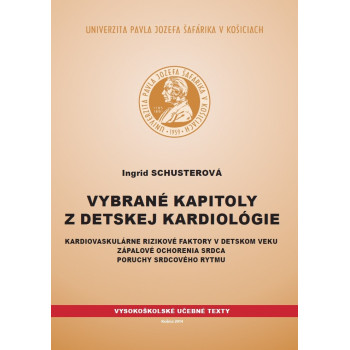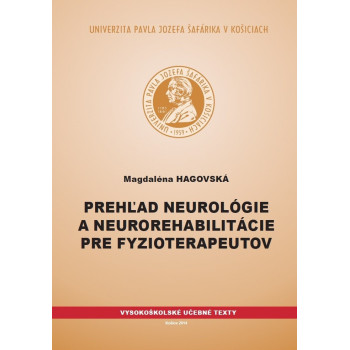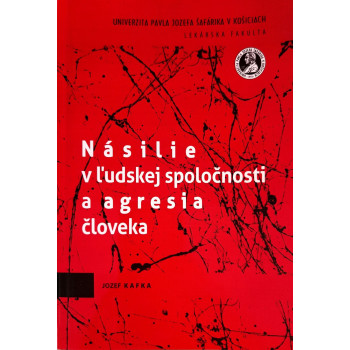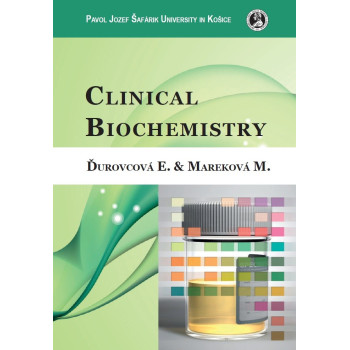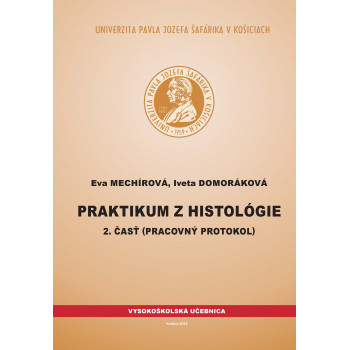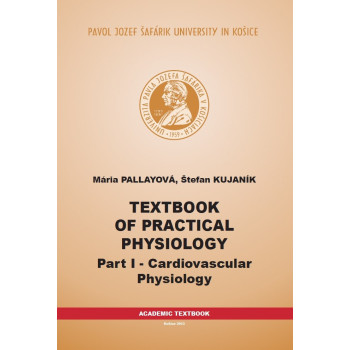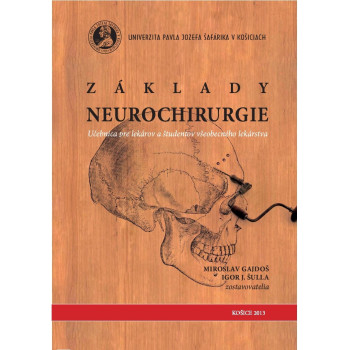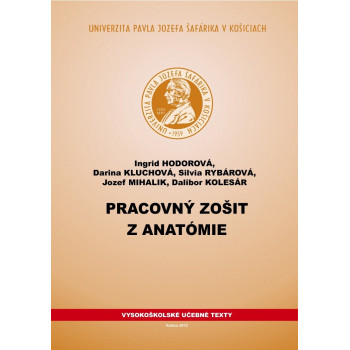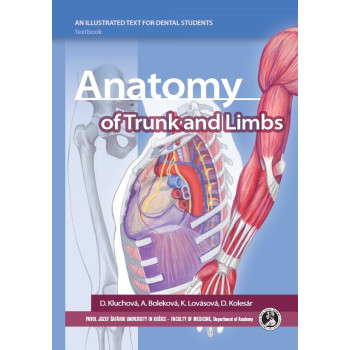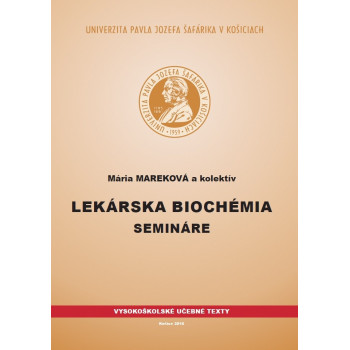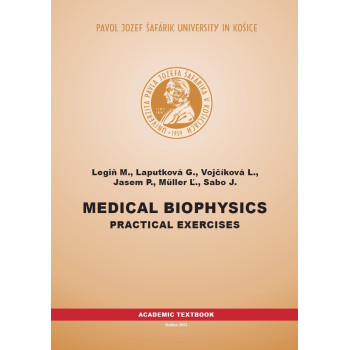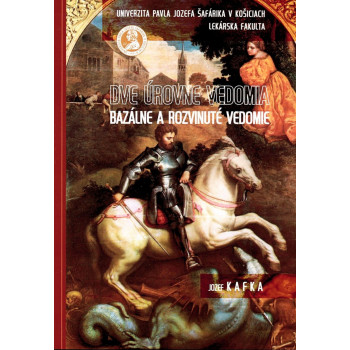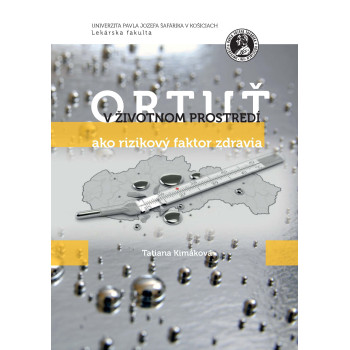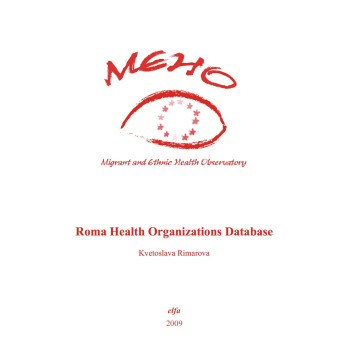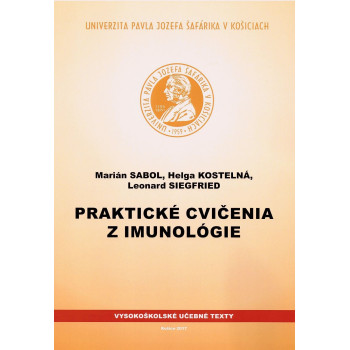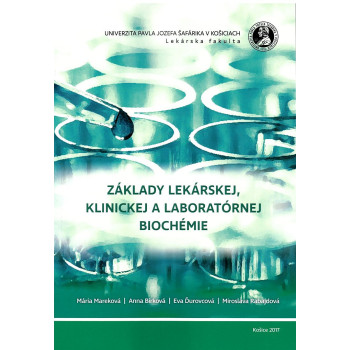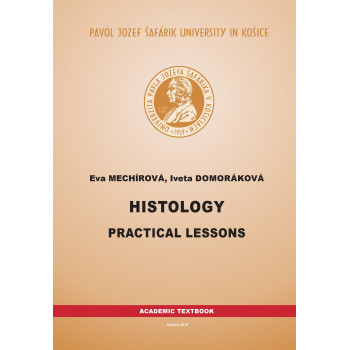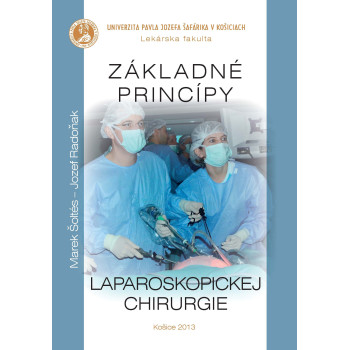Faculty of Medicine
Subcategories
There are 187 products.
Neuroanatómia pre psychológov
Květuše Lovásová a kol.
Despite the wide range of high quality textbooks offered on the Slovak market there is no publication with colorful pictures and schemes that can serve as an principal tool for practical and theoretical teaching of neuroanatomy for future psychologists in non-medical academic programmes of Arts and Science Faculties. Following new trends in methods of teaching, it is necessary to pay more attention to quality, depth, and effectiveness of education.
Such kind of illustrated textbook with the interesting graphic design should connect this important morphological subject and clinical medicine to understand the nervous system in the clinical context. This publication was created by using of original, new detailed pictures, and graphic schemes and was supplemented with a short clinical notes. It will be very helpfull to understand the details of neuroanatomical structures and brain regions.
We hope that originality and details of this book will find its application in studies of neuroanatomy for psychologists.
Praktická kinezioterapia
Magdaléna Hagovská a kol.
Vysokoškolská učebnica Praktická kinezioterapia je určená fyzioterapeutom v rámci pregraduálneho, ale aj postgraduálneho vzdelávania. Je komplexne prepracovanou, opravenou a rozšírenou publikáciou pôvodného textu skrípt Najčastejšie používané liečebné metodiky pre fyzioterapeutov (Hagovská, Mihalečková, 2012).
Fyzioterapia sa dotýka takmer všetkých základných klinických odborov. Z toho vyplýva, že fyzioterapeuti by mali ovládať základné poznatky o špeciálnych metódach, ktoré sa zaoberajú fyzioterapiou vertebrologických a neurologických pacientov, pacientov s ortopedickým ochorením, s gynekologickými a urologickými problémami, a pacientov s psychosomatickou diagnózou. Väčšina popísaných najznámejších 44 liečebných metód obsahuje obrázkovú prílohu, na základe ktorej študenti dokážu lepšie pochopiť uvádzané techniky a predísť chybnému vykonávaniu jednotlivých techník.
Autori
Anatómia trupu a končatín
Darina Kluchová a kol.
At present, there is a wide range of anatomy textbooks for medical students but at the same time there is an absence of anatomy books suitable for dental students. This book was designed as a base for study of trunk and limbs for dental students which should gain a sense of anatomy structures, but they do not need know details from these regions.
The amount of information in the book was extensively discussed with colleagues from clinical departments and with anatomy specialists from Slovakia and from abroad as well. Because of serious diversity of opinions we took into consideration also opinions of our specialists from dental medicine. Final material is considered to be a key information required for future dental doctors.
Authors
Príručka receptúrnej propedeutiky
Martina Čižmáriková a kol.
The textbook "The Pharmaceutical Compounding Propedeutics for Medical Fields" provides a systematic and comprehensive overview in the field of drug prescription, which is a very important part of pharmacology education for medical and pharmaceutical faculties. In addition to prescribing prescription drugs it also addresses the prescription of dietary foods and medical devices. A significant part of the text is dedicated to the prescription of compounded (extemporaneous) preparations which we consider irreplaceable in many fields of medicine including e. g. paediatrics or dermatology enabling personalized pharmacotherapy.
Importantly, the authors have taken into account recent changes in legislation of the Slovak Republic, including the gradual acceptance of the European Pharmacopoeia since 1995 and the introduction of generic prescription in 2011.
The book consists of the general and special section including 19 pictures, 13 tables and 11 supplements. The great contribution of the publication are abundant examples, quiz questions and tasks which help reader to better understand the particular theoretical basis. The textbook is primary intended for the student of medical and pharmaceutical faculties but it also serves as a great source of information in postgradual education of physicians and pharmacists.
Authors
Urolitiáza
Predkladaná monografia sa komplexne venuje problematike urolitiázy. Má 19 kapitol, ktoré zahrňujú celú šírku problematiky urolitiázy a to epidemiológiu, etiológiu, typy konkrementov, osobitné situácie pri urolitiáze, diagnostiku urolitiázy, zobrazovacie vyšetrovacie metódy pri urolitiáze, konzervatívnu liečbu urolitiázy, chirurgické a endoskopické metódy liečby urolitiázy, metafylaxiu konkrementov a konkrementy v močovom mechúri. V monografii sa zdôrazňuje význam individuálneho rozhodovania o optimálnom spôsobe liečby. Do úvahy sa berie veľkosť konkrementov, ich počet, lokalizácia, anatomické predpoklady a röntgenologické charakteristiky. Pri plánovaní aktívnej liečby sa zdôrazňuje význam resp. potreba zobrazovacími metódami vyšetriť aj anatómiu vývodných močových ciest. Nezastupiteľné miesto, najmä v prípadoch viacpočetnej a opakujúcej sa urolitiázy a geneticky podmienenej urolitiázy, má kompletné metabolické vyšetrenie. Dokumentuje všetky moderné spôsoby diagnostiky a liečby urolitázy. Metodicky opisuje liečbu urolitiázy – akútny management pri renálnej kolike, pri urosepse pri konkrementom zablokovanej obličke a v tehotenstve. Prevažná väčšina pacientov s urolitiázou je liečená farmakologicky a semininvazívnymi technikami. Vychádza sa z vlastných skúseností, komentuje využitie extrakorporálnej litotripsie, endoskopických metód, stentov. Monografia venuje pozornosť aj auxiliárnym metódam, ktoré sa používajú v liečbe urolitiázy, liečbe sprievodnej infekcie, poranení obličiek a močových ciest, poranení okolitých orgánov, rôznych spôsobov derivácie moču, krvácania. V závere sú spomenuté kalcifikácie pri obličkových tumoroch.
Autor
Praktické cvičenia z fyziológie - časť 1
Soňa Grešováa kol.
The object of the practical textbook is both theory and practice. The student is familiar with the investigative methods used in patients at different clinics as well as research institutes. Investigative methods are a source of knowledge about the state of the internal environment of an individual, the functionality of the various systems of the body, based on which it is possible to establish a conclusion on whether the individual is healthy or not.
Authors
Vyšetrovacie metódy v diabetológii
College textbook "Investigation methods in Diabetology" is designed for students of medicine. It can help them in preparing for an exam from internal medicine but specially in preparing for a state exam from internal medicine. The introduction is devoted to classification and diagnostic criteria of diabetes mellitus. Further It describes investigation options (clinical, laboratory, imaging) of different types of diabetes mellitus as well as its acute and chronic complications. At the end there are given diagnostics and classification of the individual components of the metabolic syndrome, obesity and dyslipidemia.
Author
Správanie (chcenie) človeka a poruchy správania
Behavior, in the slovak language expressed as an intention, belongs to basic mental processes of every individual. In this work I consider it as the basic component of an individual having two sides, outer- and inner side. I present it in the scheme No. 2.
The problem of behavior can not be fully covered, although there is a lot of writing, discussing and experimenting by ancient time.
The work may offer only few comments, approaching maily disorders of behavior. I present the original explanation of these disorders, dividing them on primary and derived ones. Primary disorders create the core of the disorder, derived disorders create a component of other disorders.
My classification of primary disorders is as follows:
- age dependent disorders of behavior
- disorders in the dynamical structure and in phases of behavior
- integrative disorders of behavior, disorders of the will, which is the sign of the developed behavior of the individual.
The work is addresses to everone who is interested in his/her owm behavior, but especially for the Medical faculty and psychiatrists, for students of all our faculties.
Author
Respiratory Physiology: The Essentials
John B. West - Andrej Andrašovský
West’s Respiratory Physiology: The Essentials is the gold standard text for learning respiratory physiology quickly and easily. This highly readable, must-have text serves as an introduction to students and a review for licensing and other exams. The Tenth Edition features the addition of Dr. Andrew M. Luks as co-author along with new clinical vignettes, additional multiple-choice review questions, and updated information on key topics in respiratory physiology, such as blood flow and metabolism, gas transport by the blood, and the physiology of high altitude.
- New! Clinical vignettes with questions emphasize how the physiology described can be applied to clinical situations and reinforce reasoning and critical thinking.
- More than 100 multiple-choice questions with full explanations provide self-testing of key concepts for comprehension and exam preparation.
- Clinical boxes and Key Concepts summaries provide bullet-point reviews.
- Appendices of important equations and answers to all questions are easily referenced.
- Online resources include animations that expand on and clarify challenging topics, an interactivequestion bank, and lectures by Dr. West.
Basic Principles of Cardiac Surgery
František Sabola kol.
Although we are not really sure if “Love is coming from the Heart” and nor we know where “the Residence of Soul” is, we are still overwhelmed by its unprecedented effort to keep us alive. Our lives are nowadays fulfilled with enormous chances to satisfy our needs and wishes. Hand in hand is changing our way of life, the intake of calories is growing and the amount of physical activity decreasing. We live longer and maybe happier but our hearts
and vessels are like mirrors showing us how we live. Diseases of the Heart and vessels have become the number one cause of death in highly developed countries including our homeland.
Prevention of cardiovascular diseases has become and an important social and health care system issue. The knowledge requirement of basic principles of cardiology and heart surgery is increasing. Without an understanding of basic principles a good clinical practice is hardly possible.
Together with my Colleagues of Heart surgery department of VÚSCH and LF UPJŠ we prepared this short overview of basic knowledge about surgery of the human heart. We hope that reading it will be more an adventure than a painful journey. If you find some answers to your unanswered questions our effort was not a waste of time.
Authors
Biology practical lessons
Helena Mičková a kol.
Skriptá sú určené pre zahraničných študentov Lekárskej fakulty UPJŠ v Košiciach, a sú písané v anglickom jazyku.
Compendium of Hygiene
The theme of the presented university textbook is a summary of selected basic knowledge of hygiene - environmental medicine. The script includes significant areas of environmental medicine as a science: the basics of environmental medicine, health and prevention issues of environmental health and risk assessment of potential exposure, the issue of air pollution, indoor pollution, problems of drinking water, the action of soil and solid waste, further issue of housing, nutrition and the impact of working conditions on health. Nutritional factors textbooks dealing with issues of rational nutrition, describe the individual components of nutrition, but also address the issue of food hygiene and the possibilities of foodborne infections. One chapter is also devoted to the impact of environmental conditions on health of children and youth.
University textbook as a manuscript consists from 199 manuscript pages, is divided into 12 basic chapters, contains 36 citations in the literature. In the Preface, the issue of categorization of diseases and define the basic concepts of health, prevention. Other chapters deal with the above selected chapters hygiene.
This university textbook comes as a basic university textbook for students of general medicine in the English language, for students of bachelor's and master's studies of medical schools - mainly bachelor's and master' program of "Public health". Students of medicine and dentistry can also use these textbooks as an educational tool in the study of other subjects in the teaching of public health.
Autor
Vybrané kapitoly z detskej kardiológie
To offer our medical students of 5th and 6th classes as well as to professional public (pediatrics, pediatric cardiologists) integrated information from pediatric cardiology, which is based on scientific knowledge of experts and practical requirements including our experiences. The publication will extend given the discipline of cardiovascular risk factors of cardiovascular heart disease and acquired heart diseases, which are more actual at the present time in the children as we as bring the new didactic methods in pediatric cardiology teaching.
Autor
Neurology- and Neuro-Rehabilitation Overview...
The presented material provides a complex view on rehabilitation of patients in neurology. It is a second completely elaborated and extended edition of the original textbook –Neurology overview for physiotherapists. It contains data on etiology of neurological diseases, pathophysiology, examination in physiotherapy and the possibilities of a conservative treatment. From special treatment methods the faciooral therapy, acral coactivation therapy are described in greater details and the possibilities of diagnosis and training of cognitive functions. In annexes standardized questionnaire methods are described, which can be used in degree (final) works. A part of the publication is the Chapter on vertebrogenic syndromes which are frequently observed in neurological disorders.
Author
Násilie v ľudskej spoločnosti a agresia človeka
Otázky človeka, jeho bytia, násilie znepokojujú ľudí od najdávnejších čias ľudskej spoločnosti a sú nemalými problémami aj v prítomnosti. V tejto pôvodnej práci, ktorej predchádzali viaceré štúdie autora (najpodrobnejšie Kafka, 2002), sa zameriavam na opísanie násilia vo všetkých základných formách, čo je jednou z jej osobitostí. Podávam operačný výmer násilia:
Násilie je vedomá ľudská činnosť využívajúca ako prostriedok násilného činu fyzickú alebo psychickú silu na ovplyvnenie druhého človeka (pri pôsobení na seba ide o zvláštny prípad násilia), ktorý potom koná pod vplyvom tohto pôsobenia nedobrovoľne, z donútenia.
Nazdávam sa, že násilie charakterizuje určitá situácia, v ktorej sa stretávajú najmenej dvaja ľudia: aktér násilia a obeť násilia, alebo sa stretajú dvaja aktéri a jeden z nich sa zvyčajne stane obeťou. To je však osobitný prípad, ktorým sa teraz nebudem zaoberať. Ak je násilie zamerané proti vlastnej osobe, je aktér násilia súčasne aj obeťou. Aktér, ktorého osobnosť a motívy bývajú rôzne, začína násilný čin využívajúc pritom viaceré prostriedky a pôsobí nimi na druhého človeka, ktorého núti vykonávať svoju vôľu, čím sa tento stáva obeťou. Celý akt má určité následky. Napadnutý sa môže brániť tak, že násilie zvládne alebo to môže skončiť tragicky, keď násiliu podľahne. Táto relatívne jednoduchá reakcia sa stáva zložitejšou pri skupinovej forme násilia a celkom neprehľadnou pri hromadnom násilí.
Opisujem tieto základné formy násilia:
- - násilie proti vlastnej osobe vrátane samovraždy,
- - násilie individuálne, spôsobené jedným aktérom násilia,
- - násilie skupinové, charakterizované malými skupinami,
- - násilie hromadné alebo kolektívne medzi veľkými skupinami, vrátane vojen a revolúcií,
- - násilie proti neživej a živej prírode.
Práca končí krátkou analýzou liečby násilného správania a dôsledkov násilia s možnosťami jej prevencie. Opieram sa aj o vlastné skúsenosti s prejavmi násilia v psychiatrických zariadeniach. Nazdávam sa, že je to práca veľmi aktuálna, informatívna, ale aj pôvodná, lebo podáva v koncentrovanej podobe celý rozsiahly fenomén násilia s jeho základnými charakteristikami. Podobnú prácu v našej literatúre nemáme.
Autor
Clinical Biochemistry
Eva Ďurovcová - Mária Mareková
The presented textbook is intended for students of general medicine and should support their knowledge about indication and interpretation of basic biochemical tests. Clinical biochemistry continues to be one of the most rapidly advancing areas of laboratory medicine, which in line with using of modern technology more and more emphasizes the evidence-based medicine in order to improve diagnosis and monitoring of patients. Selected topics have an ambition to outline and explain the most common issues of biochemical diagnosis of in internal medicine. Individual chapters are devoted to disorders of water, electrolyte and acid-base balance, kidney and liver disease, diabetes mellitus, and biomarkers used in the diagnosis of cardiac necrosis and heart failure. Given the limited range, the textbook merely summarizes the basic knowledge that students have obtained during the study of other subjects, such as medical biochemistry, pathophysiology and internal medicine, and emphasis is given to laboratory diagnosis in accordance with the newer guidelines of professional societies. We hope that the textbook will be helpful in the study of clinical subjects and encourage students' interest in laboratory medicine.
Authors
Textbook of practical physiology: part I -...
Mária Pallayová - Štefan Kujaník
The “Textbook of Practical Physiology, Part I - Cardiovascular Physiology” by Mária Pallayová and Štefan Kujaník is a practical textbook of Human Physiology intended for English speaking medical students from general medicine and dentistry curricula.
The textbook covers basic principles in cardiovascular physiology and methods of the cardiovascular examination. Adequate knowledge of the cardiovascular physiology is important for the understanding of cardiovascular system function, as well as for the diagnosis and proper treatment of cardiovascular and other diseases. The practical tasks are constructed to facilitate knowledge acquisition and encourage students to develop practical skills, for instance the ability to follow experimental protocols, to work as part of a team, and to interpret data.
The textbook is written in English and comprises 91 pages in B5 format, grouped into twelve chapters. Each chapter is divided into six sections (Introduction, Principle, Importance, Materials, Procedure, and Protocol) to facilitate students’ understanding of the topics and assist them with preparation of the laboratory reports. The text is accompanied by explanatory figures, graphs, and tables that contribute to the learning experience.
Authors
Základy neurochirurgie
Miroslav Gajdoš - Igor J.Šulla a kol.
Učebnica pre lekárov a študentov všeobecného lekárstva
Medicína je neprestajne sa vyvíjajúca vedná disciplína. Základný výskum v spojení s klinickou praxou rozširujú súčasné vedomosti, čo sa veľmi výrazne prejavuje aj v neurovedách, v praktickej podobe hlavne v neurofyziológii, neurofarmakológii, neurológii, diagnostickej aj intervenčnej neurorádiológii a v neurochirurgii. V priebehu ostatných troch desaťročí neurovedy prekonali pozoruhodný vývoj. Podnietili ho potreby praxe a umožnilo využitie poznatkov biológie, chémie, biochémie, aplikovanej matematiky, výpočtovej techniky a fyzikálnych objavov realizovaných v moderných prístrojoch i liečebných postupoch. To všetko podstatne uľahčilo, spresnilo a urýchlilo diagnostiku ochorení nervového systému, umožnilo relatívne bezpečné chirurgické zásahy na štruktúrach v minulosti nedostupných a otvorilo nové perspektívy, hlavne v oblasti reparácie poškodených tkanív, respektíve ich funkcií autotransplantáciou kmeňových/progenitorových buniek, terapeutickými zásahmi na genómovej, prípadne proteómovej úrovni. Ako vysokoškolskí učitelia sa každodenne stretávame nielen s mimoriadnym záujmom študentov i zdravotníckych pracovníkov o nové poznatky, ale aj s určitou neistotou pri posudzovaní možností, ktoré jednotlivé disciplíny patriace do skupiny neurovied ponúkajú. Jednou z príčin spomenutého javu je pravdepodobne časový faktor, keď najnovšie poznatky ešte nestačili preniknúť do odbornej literatúry, alebo v nej nie sú dostatočne zdôraznené. Druhou príčinou môže byť pomerne malá skúsenosť s niektorými ochoreniami nervového systému, ktoré sa síce vyskytujú zriedkavejšie, ale ich následky sú závažné. Cieľ, ktorý sme sledovali napísaním tejto učebnice, bolo aspoň čiastočne odstrániť spomenuté nedostatky všetkých odborných publikácií.
Počas prípravy rukopisu sme sa snažili, aby terapeutické postupy, názvy liekov a ich dávkovanie boli v súlade s najnovšími poznatkami vedy a klinickej praxe. Oprávnene však môžeme predpokladať, že budúce objavy zmenia súčasný pohľad na problematiku diagnostiky aj liečby ochorení nervového systému.
Vysokoškolská učebnica je určená študentom všeobecného lekárstva UPJŠ Lekárskej fakulty v Košiciach a lekárom, zameraným hlavne na všeobecné lekárstvo.
Kolektív autorov
Pracovný zošit z anatómie
Ingrid Hodorová a kol.
„Pracovný zošit z anatómie“ je určený pre výučbu študentov nelekárskych bakalárskych odborov ako doplnkový študijný materiál. Z dôvodu, že študenti uvedených odborov nemajú možnosť kontaktu s reálnymi anatomickými štruktúrami je pre nich výučba predmetu anatómie neatraktívna. Veríme, že predkladaný pracovný zošit so svojimi ilustráciami anatomických štruktúr umožní študentom aktívnejšie sa zapojiť do vyučovacieho procesu, čím sa pre nich predmet anatómie stane prístupnejší a atraktívnejší.
Kolektív autorov
Anatomy of Trunk and Limbs
Darina Kluchová a kol.
An illustrated text for dental students
Lekárska biochémia - semináre
Mária Mareková a kol.
Medical biochemistry is integral parts of basic theoretic knowledge of contemporary graduate at medical faculties. This textbook intends to help the undergraduate students of study branches General Medicine and Dental Medicine for the course of “Medical Biochemistry”. It is structured into 10 chapters concerning several topics: enzymology, cells membrane, metabolism, biochemistry of blood and organs, as well as some parts of clinical biochemistry.
The theoretical knowledge of this subject, which student obtains in the lectures, is verified in laboratory practices and is expanded in seminaries. Our selection of topics makes the text especially appropriate for medical students and managing of problems gives the students satisfactory ground for effective study of medical biochemistry and other related study subjects (e.g. clinical biochemistry, physiology, pathophysiology) in the sense of comprehension of relative continuity and interdependence of biochemical process or their function respectively.
Since the textbook brings only the skeleton survey on the biochemical problematic concerning medicine, students should broaden presented facts by additional study from lectures and/or from other sources. We expect this study literature to serve as a basic study material for mentioned medical study branches for preparation to written part of exam from “Medical Biochemistry”.
Authors
Medical Biophysics: Practical Exercises
Michal Legiňa kol.
Progress in biology and medicine has always been significantly related to advances in physics. Not only has physics supplied instruments and methods of measurement that have led to many discoveries in physiology and medicine, but methods of physical research have changed many of the older approaches to the biologic sciences. Such circumstances have even led to development of a new scientific field: biophysics, which uses to a great extent physical instrumentation procedures applied to an experimental system. Because any instrument is an additional factor in any experimental system, it may affect the data. To interpret physical data on biological material correctly then, it is necessary to consider the characteristics of instrument response.
A practical course enables a student to acquire some skills, experience and methodological knowledge for performance of experiments and evaluation of measured data. Due to the fast development of instrumentation technology, it is not possible to teach every operation and procedure upon instruments we may use in a future. Besides the basic physical principles, the aim of a practical course is to point out some general rules and skills for instrument operation and for the interpretation of the measured values derived from such operation.
There are two kinds of lessons in practical courses. The first one focuses on laboratory measurements of some important physical quantities and the evaluation of the measured data. These measured quantities are components of the subject “medical biophysics” or of the phenomena studied. Experience provided in managing various scales and tables, as well as in the construction of tables and graphs is substantial. Lessons also enable students to repeat and to strengthen their knowledge of secondary school physics, which is useful for understanding of many phenomena studied in medical biophysics. The second kind of lesson provides experience with some of the diagnostic and therapeutic medical instruments, which can be seen in practical medicine.
The understanding of basic physical principles of corresponding instruments is both recommended and demanded. Theoretical preparation is not only an appropriate condition for the practical managing of the whole lesson, but also helps to avoid injury. This textbook, therefore, intends to help students in preparing for both the practical lessons and the final exam.
Authors
Dve úrovne vedomia: bazálne a rozvinuté vedomie
Význam vedomia pre každého človeka ale aj pre poznávanie je taký rozhodujúci, že by bolo nesprávne hovoriť o ňom iba pri psychických procesoch, lebo je jadrom ľudskej individuality a práve vedomím sa človek odlišuje od ostatných živých tvorov.
Je potešujúce, že nová oblasť poznávania označovaná ako veda o mysli začína sa vedomím zaoberať podrobnejšie a vylučuje tvrdenia, že vedomie nejestvuje hoci zatiaľ hovorí podľa mojej mienky iba o bazálnom vedomí a jej interpretácie prekračujú zistené fakty.
V svojej odbornej činnosti a aj v učebniciach som rozlišoval dve cesty poznávania vedomia a iba postupne som si uvedomil, že mám pred sebou dva úrovne vedomia. V tejto práci rozlišujem tieto dve úrovne:
- bazálne vedomie,
- rozvinuté vedomie.
Ak bazálne vedomie vyjadruje bdenie a spánok, tiež pozornosť a gnostické rozpoznávanie, teda idiognózia a somatognózia, rozvinuté vedomie predpokladá reč a vytvára také prejavy, ktoré označujeme ako duševné, teda identita, sebarealizáciu, čo vyjadruje schopnosť uvedomovania si seba, okolia, spoločnosti ale aj všetkého čo sme schopní poznať.
Také chápanie je blízke výkladu fyziológa Pavlova o dvoch signálnych sústavách a chápaniu Poppera o treťom svete ale aj ďalšie náhľady, nikto však neurobil určitejšie závery a nedošiel k náhľadu, že naše vedomie má dvojvrstevnú podobu, dve úrovne.
Napriek rozsiahlej a takmer neprehľadnej literatúre vieme o vedomí málo, okrem toho, že je to schopnosť uvedomovania, teda schopnosť uvedomiť si, že jestvujem, že som, že jestvujú aj iní ľudia, že jestvuje niečo čo označujeme ako svet ako nepredstaviteľný vesmír. Uvedomujem si, že som individualitou jedinečnou, ale limitovanou narodením a smrťou a že mám aj zmysel svojho bytia. Toto uvedomovanie, akokoľvek spochybňované je pre človeka prítomné v jeho poznávaní, hoci nemáme zmysly, ktorými by sme vedeli lokalizovať jeho prítomnosť v mozgu, ale svojou charakteristikou s dynamikou a integráciou má však duševný charakter, odlišný od ostatných prejavov mozgovej činnosti.
Práca sa pokúša v deviatich kapitolách osvetliť, čo sa chápe pojmom bazálne a rozvinuté vedomie a možno ju rozdeliť do troch okruhov:
V prvých šiestich kapitolách diela hovorí o vedomí ako o doméne bytia človeka, podáva sa preto výklad vedomia a jeho rozlíšenie, potom sa hovorí o kolobehu života a rozvoji vedomia, kladie sa otázka vedomia u stavovcov, potom náhľady filozofické a metodológia skúmania vedomia. Nasledujú ďalšie kapitoly, ktoré analyzujú podrobnejšie dve formy, úrovne vedomia, sú to kapitoly 7-9, začínajú analýzou individuality človeka, lebo to je báza vedomia aj jeho foriem, ďalej kapitoly o bazálnom vedomí a rozvinutom vedomí, čo považujem za jadro predkladanej práce. Napokon sa opisujú niektoré poruchy vedomia, ktoré dokladajú realitu vedomia v podobe jej porúch ale aj možnosti rozlíšenia dvoch úrovní, ktoré sa dajú zistiť pri starostlivom štúdiu a pri práci s chorými.
Ortuť v životnom prostredí ako rizikový faktor...
Táto vedecká monografia je komplexnou vedeckou prácou zameranou na prítomnosť a pôsobenie ortuti v životnom prostredí, ale aj na rizikové faktory zdravia, ktoré sú s ňou spojené. Monografia predstavuje charakteristiku ortuti v multidisciplinárnom zábere, prezentuje využitie v priemysle a v zdravotníctve, popisuje negatívne vplyvy ortuti v životnom prostredí, na zdravotný stav obyvateľstva. Zároveň prináša návrhy a odporúčania pre rizikové skupiny ľudí. Súčasťou monografie je komplexný výskum koncentrácie ortuti vo vzorkách komodít domácej i zahraničnej produkcie a vo vzorkách rastlín pomocou atómového absorpčného spektrometra AMA 254. Vedecká monografia je vhodná pre vedeckú komunitu, študentov medicínskych, veterinárnych, prírodovedných a poľnohospodárskych odborov ako aj pre študentov verejného zdravotníctva všetkých troch stupňov vysokoškolského štúdia. Monografia je učená aj pre všetkých záujemcov z radov informovanej verejnosti.
Autorka
Roma Health Organizations Database
E-book
Praktické cvičenia z imunológie
Marián Sabol - Helga Kostelná - Leonard Siegfried
Cieľom učebných textov je poskytnúť študentom medicíny a príbuzných odborov poznatky o základných imunologických metódach, ktoré sa využívajú v klinickej praxi. V učebných textoch sú zahrnuté metódy na vyšetrenie fagocytózy, komplementu, imunoglobulínov, autoprotilátok, HLA molekúl a T lymfocytov. Súčasťou textov sú aj postupy pre izoláciu a stanovenie počtu vybraných typov buniek imunitného systému. Kombinácia klasických metód (rozetové testy, fluorescenčná mikroskopia) a moderných metód (napríklad prietoková cytometria a ELISPOT) umožňuje orientáciu v základných laboratórnych metódach imunológie.
Základy lekárskej,klinickej a laboratórnej...
Mária Mareková a kol.
Predkladaná vysokoškolská učebnica predstavuje základy biochémie a je určená predovšetkým pre bakalárske študijné programy (napr. ošetrovateľstvo, fyzioterapia, verejné zdravotníctvo). Vysokoškolská učebnica predstavuje zjednodušenú alternatívu lekárskej biochémie a je svojím obsahom aj rozsahom vhodná pre študentov nelekárskych študijných odborov. Okrem priblíženia základných metabolických dejov prebiehajúcich v organizme človeka, ponúka aj stručný prehľad klinicko-biochemických parametrov štandardne vyšetrovaných pri podozrení na ich poruchy. Snaží sa poskytnúť študentom, predovšetkým zdravotníckych študijných programov, základy lekárskej a klinickej biochémie a oboznámiť ich s najčastejšie používanými metódami v biochemickom laboratóriu v primeranom rozsahu. Chce prispieť k prehĺbeniu vedomostí o metabolizme zdravého, ale i chorého človeka, resp. o klinicko-biochemických diagnostických postupoch a laboratórnych vyšetreniach a vzbudiť záujem o ďalšie vzdelávanie. Budeme radi, ak poslúži nielen ako príprava na skúšku, ale bude inšpiráciou napr. pre realizáciu diplomových prác zameraných na vedecko-výskumnú oblasť klinickej biochémie či laboratórnej medicíny.
Autorky
Histology (Practical lessons)
Eva Mechírová - Iveta Domoráková
The content of this "Practical lessons" represents a record of the appearance, under the light microscope of the tissues, organs and systems of the human body. In addition, it provides visual guidelines during the practical phase of a histology course. It is hoped that this book will be especially useful to students to understand fully the microscopic structure of human tissues and organs.
Authors
Základné princípy laparoskopickej chirurgie
Laparoskopická chirurgia dnes predstavuje štandardnú a v mnohých ohľadoch preferovanú modalitu chirurgickej liečby. Dynamika jej celosvetového rozšírenia, umožnená pokrokom v biomedicínskych technológiách a rozvojom globálnych informačných a komunikačných kanálov, nemá v histórii chirurgie obdobu. V súčasnosti už prakticky neexistuje žiadna brušná operácia, ktorá by sa nevykonávala laparoskopickým spôsobom, pričom v mnohých prípadoch je už laparoskopický postup metódou voľby.
Napriek, a možno práve vďaka bezprecedentne rýchlej penetrácii laparoskopických operácií do každodennej chirurgickej praxe naďalej v mnohých ohľadoch absentujú všeobecne akceptované technické štandardy. Vysoká variabilita procesných postupov v rámci jednotlivých laparoskopických operácií vychádza skôr zo zvyklostí daného pracoviska ako z medicíny založenej na dôkazoch. Táto situácia je ďalej modifi kovaná rozvojom nových a staronových koncepcií charakteru minilaparoskopie, SILS či NOTES a ich hybridných kombinácií s klasickou laparoskopiou.
Cieľom monografi e je pritiahnuť pozornosť odbornej verejnosti späť k základným princípom laparoskopickej chirurgie, ktoré by mali byť základňou pre efektívne a bezpečné vykonávanie laparoskopických operácií, ako aj bázou pre kritický postoj k módnym inovatívnym trendom. Obsahovo sa sústredí skôr na všeobecne menej známe a v našich podmienkach zriedkavo diskutované témy, ktorých význam sa hlbšie analyzoval len v nedávnej minulosti. Našou ambíciou bolo vytvoriť vyvážený materiál, ktorý by bol zaujímavým primárnym informačným zdrojom nielen pre lekárov špecialistov, ale aj pre poslucháčov lekárskych fakúlt a kolegov v špecializačnej príprave v chirurgických odboroch.
Autori


